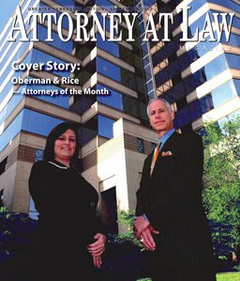Transcript of “Using Bail to Get out of Jail”
Author: Steven Oberman
Click here to listen to the podcast.
Originally Posted: March 11, 2011
It’s 2:00 in the morning – you just got a call from your child – or your friend. They’ve been arrested for Driving Under the Influence. They want to get out of jail – now. You, like most people, haven’t experienced this situation before and have no idea what to do next.
This is your host, Steve Oberman, and today I will explain the law and the process of getting someone out of jail before trial – legally of course. Most people hesitate to call their lawyer in the middle of the night, but I assure you, a good DUI defense lawyer prefers you calling as soon as possible. I’ll explain why later in the podcast. In the meantime, let’s get started…
Generally the posting of bond is not a complicated matter for a person charged only with DUI. However, release from jail can become more complicated in situations where the defendant is charged with a multiple offense DUI or more serious crime such as vehicular assault or vehicular homicide. Different rules may apply if the defendant is on probation for a previous charge at the time of the offense.
Bail is a means of obtaining the release of a person charged with a criminal offense to guarantee his appearance to face such charges, while at the same time protecting the public. Release may be achieved in several ways, which I will later discuss.
Notably, in some states, it is a criminal offense for a practicing attorney to sign any bond or enter into any recognizance as surety for the appearance of any person, other than a member of the attorney’s immediate family, in any criminal case pending against the person. This prohibition avoids any possible conflict of interest between the lawyer and the client.
Now, you may ask, doesn’t a person have the right to bail?
In most states, a defendant has the right to bail in all cases involving an original charge except where the death penalty (a capital case) may be imposed. Even in capital cases, the defendant may be entitled to bail unless the proof is evident or the presumption great. Exceptions to a defendant’s right to bail exist pending appeal following a conviction, pending a probation revocation proceeding, or where a crime is committed while the defendant is already on bail. Furthermore, the United States Constitution prohibits excessive bail. That’s why a judge can’t just set an excessive bail to assure a defendant will not gain his freedom.
Other than setting a monetary amount of bail, the court will also determine whether the defendant is a danger to the community. Many jurisdictions prohibit releasing a person if the court believes they will be a continuing danger to the community. In the context of DUI cases, a person may be considered a danger to the community if they are a multiple offender or re-offend while released on bond.
The use of monitoring devices may be considered by a court to eliminate the perceived danger to the community. Such devices include, but are not limited to: ignition interlock devices, transdermal monitoring devices or other alternative alcohol monitoring devices, electronic monitoring with random alcohol or drug testing; or pretrial residency in an in-patient alcohol or drug rehabilitation center.
If the court does not determine that the danger to the community can be eliminated, the defendant may remain incarcerated and held without bond.
So, what is the procedure?
When a person is arrested, they are taken without unnecessary delay before a magistrate, a judge or other person to set bail conditions. Without unnecessary delay generally means several hours, though it could mean several days – particularly if the arrest occurs over a holiday. A lawyer may be able to expedite the process if there is an unreasonable delay.
Once the conditions of release are set, they may be changed at the request of the prosecutor, the defendant or by the court itself.
So, how much bail should be set? Absent a showing that release upon personal recognizance, with or without conditions, will reasonable assure the appearance of the defendant in court, a monetary bond is typically required prior to release. Bail must be set as low as the court determines is necessary to reasonably assure the appearance of the defendant.
The usual factors considered by the court in determining an appropriate bond include: (1) the defendant’s length of residence in the community; (2) the defendant’s employment status, history, and financial condition; (3) the defendant’s family ties and relationships; (4) the defendant’s reputation, character, and mental condition; (5) the defendant’s record for appearance at prior court proceedings; (6) the nature of the offense and apparent probability of conviction and likely sentence; (7) the defendant’s prior criminal record and the likelihood that because of such record the defendant will pose a risk of danger to the community; (8) the identity of responsible members of the community who will vouch for the defendant’s reliability; and (9) any other factors indicating the defendant’s ties to the community or bearing on the risk of willful failure to appear.
Now what happens after the bail has been set? How do you get somebody out of jail? While other methods exist, today I will discuss 4 different ways.
1. Release on Personal Recognizance or Unsecured Appearance Bond
I briefly mentioned this method. Rather than setting a monetary bond, anyone authorized to admit the person to bail may order the defendant’s release upon their personal recognizance. This type of release is granted based solely upon the defendant’s assurance that he will appear in court although it may also include conditions designed to assure his appearance. This is the easiest and least expensive method.
2. A Driver’s License Deposit as a Bond
Sometimes a citation or arrest is made charging the defendant with a violation of a municipal ordinance or traffic law, which allows the defendant the option of depositing his driver’s license as security for his appearance to answer the charge. In this circumstance, the officer or court will issue the defendant a receipt for the license, which allows the defendant to continue operation of a motor vehicle while the case is pending.
3. Cash Appearance Bond
A cash appearance bond, or “cash deposit,” with the court clerk (although sometimes it’s actually through the jailor) allows the defendant to be released immediately from custody on the pending charge. Although the defendant loses the use of the money until the final disposition of the charge, the entire deposit is returned to the defendant once discharged from all obligations in the case unless the court orders otherwise. If a defendant chooses to post bail by cash deposit, he or she may be required to deposit an amount equal to the full amount of bail set by the court.
If judgment for a fine and/or court costs is entered in the prosecution against the defendant, the cash deposit is generally applied to the payment of the judgment.
4. Professional Bonding Company
This is the most common method. You can easily find a bonding company in the phone book or online. The first question you should ask is whether the bonding company has a representative already at the jail so the release will not be further delayed. Usually the defendant or someone on his behalf pays the bondsperson a nonrefundable fee (10% is typical). In addition to the fee, a professional bondsperson may also assess an initiation fee (that’s usually about $25.00). The bondsman may also require some other type of security to insure the defendant’s appearance in court. If the defendant fails to appear, the bonding company may be required to pay the full amount of the bond to the court clerk. It really doesn’t make much difference which bonding company you use. The fees and security requirements are generally the same, but if you don’t feel comfortable with the requirements, use a different company. There are usually representatives from several companies at the jail or close by during all hours of the day and night.
Now you have a better understanding about the general procedure on setting bail. There are many issues that arise in getting someone out of jail and keeping them out before the trial – like when they are released, but don’t appear in court. But that’s another program.
Before I conclude, though, I want to emphasize that there are situations where it is to the person’s advantage to contact a lawyer before release from jail. For instance, our law firm is set up to obtain a blood or urine sample from the defendant upon their arrival at the jail. If we waited until they were released, the alcohol may be eliminated from their body. In this way, we may actually be able to prove sobriety when a chemical test is not offered by the police or if it is refused by the defendant. So, the best advice I can give you is to contact a lawyer immediately upon learning someone has been arrested.
We hope you enjoyed listening to the DUI law podcast1 produced by the Oberman and Rice Law Firm. You may read about related legal matter on our websites at https://tndui.com/ and http://www.duiknoxville.com or visit our blog at http://www.tnduicenter.com. You may also speak to one of our lawyers by calling (865) 249-7200. Until next time, remember to drive safely.
Portions of this podcast were taken from Mr. Oberman’s text, DUI: The Crime and Consequences, Published by West/Thomson Reuters, 2011.See https://www.tndui.com/oberman-dui-textbooks#tndui
Featured Posts
 March 25, 2025
March 25, 2025
Tennessee Drivers’ Licenses May Go Electronic
Tennessee Senate Bill 1297 was introduced this year proposing to allow Tennesseans to use Digital Driver’s Licenses (DDLs) as a valid form of identification wherever an ID is legally required, except for voting. The DDLs would allow Tennesseans to download an […]
Read More
 February 26, 2025
February 26, 2025
Potential Change in Legislation for Providing Proof of Registration to Law Enforcement
When a driver is pulled over in Tennessee for any reason, the normal request from law enforcement is: “Please provide me with your driver’s license, insurance, and proof of registration.” If you are like this author, digging through your glovebox […]
Read More February 17, 2025
February 17, 2025
Domestic Violence/Domestic Assault/Domestic Abuse Definitions
Domestic Violence/Domestic Assault/Domestic Abuse Definitions We are often asked about the difference between an assault (sometimes referred to as a “simple” assault), and a domestic abuse assault. This is an important distinction in the law because there are different bond […]
Read MoreContact
Office
Oberman & Rice
550 Main Street
Suite 730
Knoxville, TN 37902
Phone Number
(865) 249-7200
(865) 540-1696 (fax)
GPS Coordinates
Long: 35.970504
Lat: -83.914776
Useful Links
contact us today for a free consultation
We reply to non-urgent after-hours requests for consultation within 24 hours. For after-hour emergencies, please call us at (865) 249-7200.














